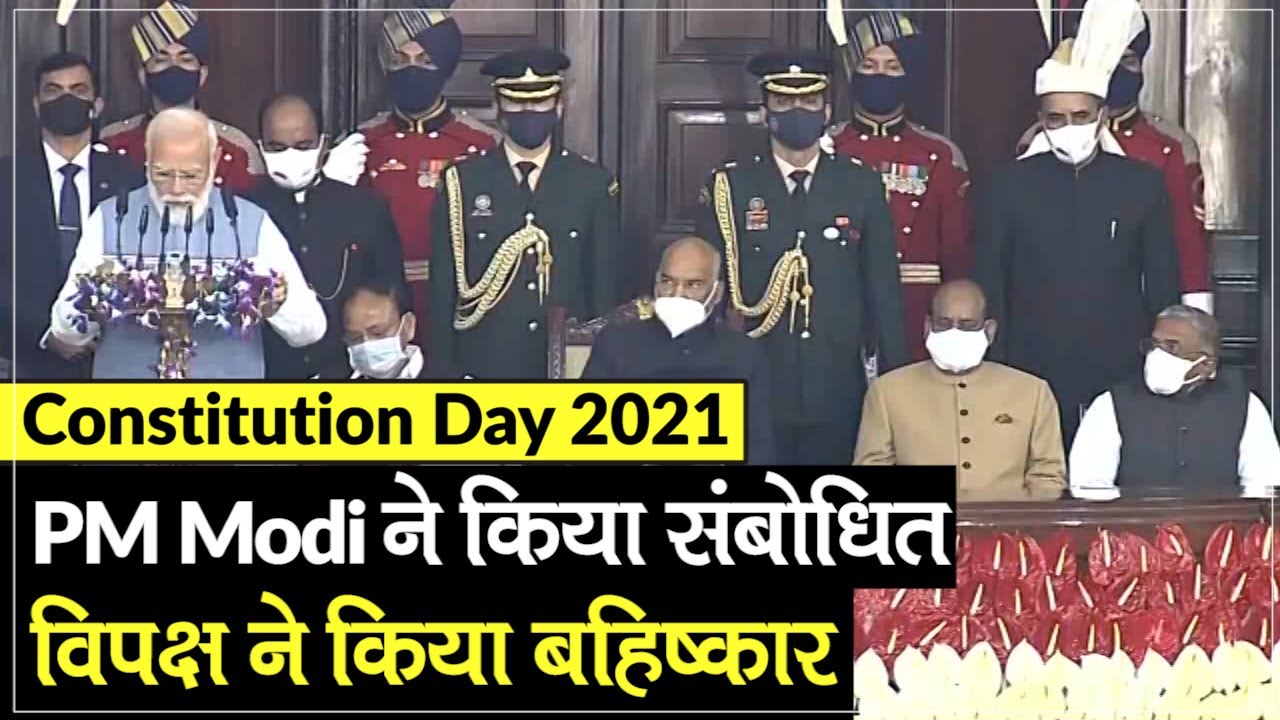


As India celebrates the 75th anniversary of its Constitution, the political scene is abuzz with discussions on its teachings and values. The Congress has requested two days in Parliament to discuss the document, while President Droupadi Murmu stressed its significance in a joint sitting. The Supreme Court also upheld the validity of ‘secular’ and ‘socialist’ in the Preamble, with Vice President Jagdeep Dhankhar emphasizing the need for constructive dialogue to uphold the sanctity of our democratic institutions and promote informed citizenship.
Celebrating the Importance of India's Constitution
India is marking the 75th anniversary of its Constitution, which was adopted on November 26, 1949, following two years of deliberations by the Constituent Assembly. The Constitution is a sacred document that defines the country's framework of government and the fundamental rights and duties of its citizens.
Political Discussion and Significance
As India celebrates this milestone, the importance of the Constitution and its teachings is being widely discussed in the political arena. The Congress party has requested two days in Parliament to debate the document, highlighting its enduring relevance. President Droupadi Murmu, addressing a joint sitting of Parliament, emphasized the Constitution's significance as the guarantor of India's sovereignty, unity, and integrity.
The Supreme Court played a crucial role in upholding the validity of the words "secular" and "socialist" in the Constitution's Preamble. These terms, the court stated, are essential to the foundational principles of the Indian state.
Vice President Jagdeep Dhankhar stressed the need for constructive dialogue to uphold the sanctity of democratic institutions and promote informed citizenship. He urged all stakeholders to engage in meaningful discussions to strengthen India's constitutional framework.
Background
The Indian Constituent Assembly was formed in 1946 following India's independence from British rule. It was tasked with drafting a constitution that would reflect the aspirations of the newly independent nation. The Assembly, which included prominent figures such as Dr. B.R. Ambedkar, spent two years debating and deliberating over the Constitution's clauses and provisions.
The Constitution was finally adopted on November 26, 1949, and it came into effect on January 26, 1950, marking the birth of the Republic of India.
Top 5 FAQs and Answers
1. What are the key features of the Indian Constitution?
The Indian Constitution is the world's longest, with 395 articles and 12 schedules. It establishes a parliamentary system of government with a bicameral legislature, a federal structure with a strong center, and an independent judiciary.
2. What is the significance of the Preamble to the Constitution?
The Preamble to the Constitution defines India as a sovereign, democratic, republic. It also proclaims India's commitment to social, economic, and political justice, as well as liberty, equality, and fraternity.
3. Who was the Chairman of the Constituent Assembly?
Dr. B.R. Ambedkar, also known as the "Father of the Indian Constitution," served as the Chairman of the Constituent Assembly and played a pivotal role in drafting the Constitution.
4. What are the fundamental rights guaranteed by the Constitution?
The Constitution guarantees a wide range of fundamental rights to Indian citizens, including the right to life, liberty, and equality; freedom of speech, expression, and assembly; and the right to property and religious freedom.
5. How has the Constitution been amended over time?
The Constitution has been amended 104 times since its adoption. These amendments have been made to address changing circumstances and to adapt the Constitution to evolving needs and aspirations.

The Pasighat police in East Siang district, Arunachal Pradesh have arrested the 33-year-old boys' hostel warden of Sanggo English School for sexually assaulting minor students. This came to light when a student was hospitalized for urogenital complications. The incident has sparked outrage from parents and the public, demanding strict action against the accused warden. In response, the Arunachal Pradesh State Human Rights Commission (APSHRC) has taken suo motu cognisance and ordered for a detailed report on the investigation, victim protection, and school management.

Actress Siddiqa Begum, daughter and legal heir of Shah Bano, has served a legal notice on the makers of the upcoming Bollywood film 'Haq'. The notice states that the film's unauthorized depiction of the personal life of Shah Bano without the consent of her legal heirs is a violation of their rights. 'Haq' is based on the landmark 1985 Supreme Court case that granted maintenance to Shah Bano, a Muslim woman, from her divorced husband.

After four years, the 'Darbar Move' tradition in Jammu and Kashmir has been restored, fulfilling the promise of the government and bringing a boost to the economy. National Conference chief Farooq Abdullah expressed happiness, noting that those who sought to separate Jammu and Srinagar have failed. Chief Minister Omar Abdullah received a warm reception and inspected the secretariat premises after the ceremony, as security in the region was heightened for the occasion.

Delhi Legislative Assembly Speaker Vijender Gupta praised Swami Dayanand Saraswati as not just a saint and reformer, but also a pivotal figure in India's freedom struggle. Speaking at the International Arya Samaj Conference, Gupta highlighted how Swami Dayanand's teachings sparked a revolution that led to the nation's independence. The event was attended by esteemed guests including Gujarat Governor Acharya Devvrat and top officials from the Arya Samaj community, all paying tribute to the enduring impact and legacy of Swami Dayanand Saraswati.

The Metro Railway Kolkata has announced a major schedule expansion for its Yellow Line, which runs between Noapara and Jai Hind Bimanbandar (Airport) in Kolkata. Starting from 3 November, weekday operations will increase to 120 services with extended operating hours, providing greater convenience and accessibility to commuters. Weekend travellers will also see a significant frequency upgrade, making travel on Saturdays and Sundays hassle-free. This move is expected to improve the overall public transportation system in the city and benefit the commuters.

Despite some reassurances that online verticals focused on diversity will continue, NBC News has announced a round of layoffs that will impact about 150 employees, or 2% of their workforce. The cuts are said to be a result of cost-cutting measures in preparation for the split of Comcast's cable networks into Versant. This move signifies a shift in priorities for NBC management, prioritizing corporate profits over hard-working members, according to Susan DeCarava, president of The NewsGuild of New York. This change also means that MSNBC will no longer lean on NBC News for newsgathering, with those ties expected to be severed next week.

The Kasibugga Venkateswara Temple in Srikakulam district was the site of a heart-wrenching stampede, causing multiple fatalities and affecting the community deeply. Chief Minister N. Chandrababu Naidu has expressed his sorrow over the unfortunate incident, as well as directing officials to ensure that those injured receive the best medical treatment possible. As local officials and public representatives are called to oversee relief operations, swift action is required to aid those affected and manage the situation effectively.

Indian Prime Minister Narendra Modi inaugurated the Shanti Shikhar Academy for Peaceful World in Raipur, praising the Brahma Kumaris organization for bridging India's ancient wisdom with the world's search for harmony. He credited the group's selfless service and spiritual discipline for their efforts towards universal peace. He positioned the Brahma Kumaris as protectors of India's soul and highlighted India's proactive role in addressing global crises such as disaster relief and environmental threats.

In an act of solidarity and protest, millions of Muslims in India used their Friday prayers to denounce the recent killings that took place in Pahalgam. The news comes amid growing tensions between the Muslim community and the Indian government. Many are viewing this as a sign of unity and determination from the Muslim population in India.

The state of Karnataka, or Kannada Rajyotsava, marked its 69th anniversary with a grand ceremony organized by the district administration in Mangaluru. District in-charge minister Dinesh Gundu Rao paid tribute to the leaders and writers who fought for a unified Kannada state and presented awards to 80 outstanding individuals and organizations. In his address, the minister highlighted the rich cultural and historical heritage of Karnataka and called for a sense of pride among its citizens.